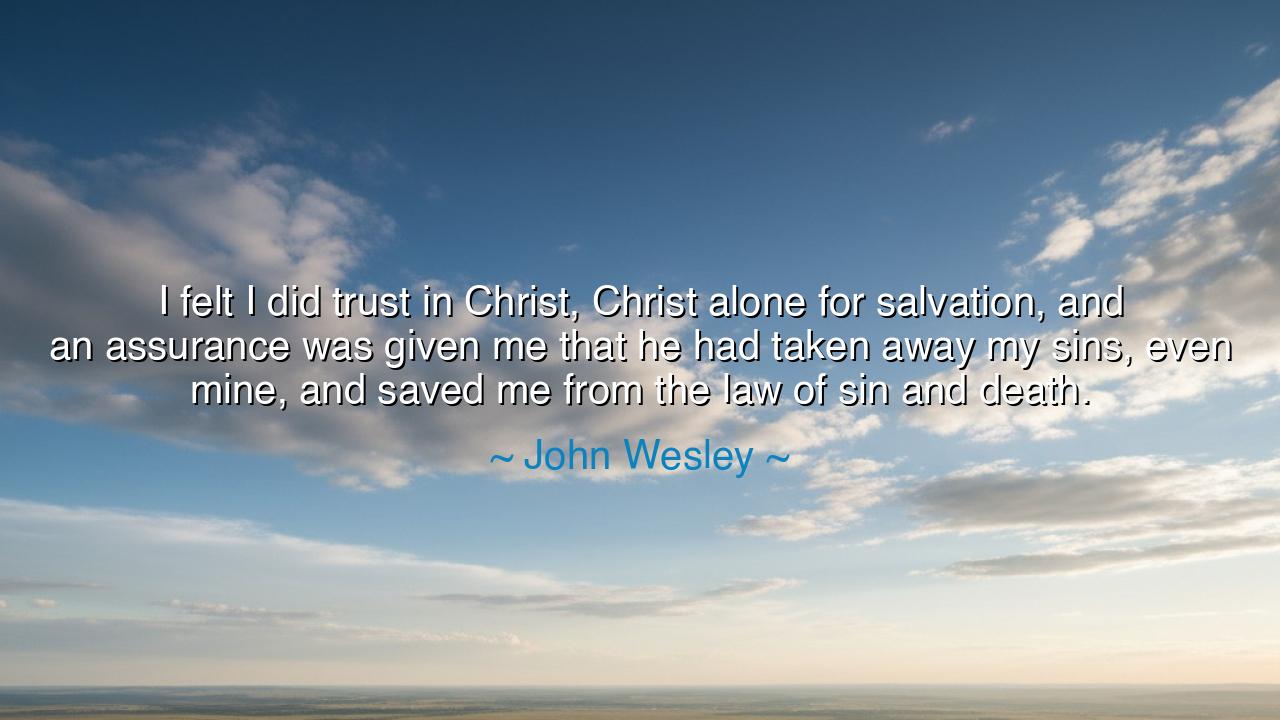
I felt I did trust in Christ, Christ alone for salvation, and an
I felt I did trust in Christ, Christ alone for salvation, and an assurance was given me that he had taken away my sins, even mine, and saved me from the law of sin and death.






In the sacred words of John Wesley, founder of Methodism, he declared, “I felt I did trust in Christ, Christ alone for salvation, and an assurance was given me that he had taken away my sins, even mine, and saved me from the law of sin and death.” These are not merely words of faith, but a testimony of spiritual awakening, a moment when the veil between the mortal and the divine was lifted, and the soul beheld the truth of grace. This declaration was born on that famed evening of May 24, 1738, in Aldersgate Street, London — an evening that would ignite a movement and awaken thousands of hearts to the living fire of faith.
Wesley had long been a man of discipline and devotion, yet for years his heart was restless. He had crossed the seas to preach in the colonies, he had prayed, fasted, and studied the Scriptures — yet he had not found peace. His faith was a structure of intellect, not yet a flame of the soul. But that night, as he listened to a reading from Martin Luther’s preface to the Epistle to the Romans, he felt what he described as his heart “strangely warmed.” In that instant, the cold walls of doctrine melted into a living encounter. It was no longer theology — it was trust, assurance, salvation made personal.
In his words, “Christ alone for salvation” became the very heartbeat of his faith. No longer would he seek redemption through works, law, or ritual, but through the simple and profound surrender of the heart to divine grace. He realized that salvation was not earned by climbing to heaven on the ladder of good deeds, but by opening the soul to the One who descends from heaven to lift us. The “law of sin and death” — that ancient bondage which holds mankind captive — was broken, not by human effort, but by love incarnate.
The story of Wesley mirrors that of countless souls who have wandered the deserts of doubt before discovering the oasis of faith. Consider St. Augustine, centuries earlier, who wrestled with temptation and despair, only to be transformed by the divine voice saying, “Take up and read.” When he opened the Scriptures and read the words of Paul, his heart too was pierced by conviction and lifted by mercy. Both men, Augustine and Wesley, were scholars and seekers who found that intellect could not save them — only the living Christ, known not through reason but through relationship, could bring peace.
This moment of Wesley’s assurance was not mere emotion; it was the seed of a movement that would call millions to holiness of heart and life. His experience reminds us that every soul must one day stand alone before its Maker — stripped of reputation, unguarded by ceremony — and learn to trust Christ alone. To know that one’s sins are not only forgiven in theory, but “even mine,” is to taste the boundless mercy that turns fear into joy, and guilt into gratitude.
And so, the lesson for us is this: seek not only to know about God, but to know Him personally. Let faith be not a creed recited by habit, but a fire that burns within the heart. When despair or doubt press upon you, do not turn inward to your strength, but upward to the One who takes away sin and death. Like Wesley, wait patiently until assurance dawns — for grace often comes not with thunder, but with a gentle warmth that transforms everything it touches.
In the end, Wesley’s revelation teaches us that the path to salvation is not paved with perfection, but with trust. Trust that Christ’s love is enough, that His mercy extends to “even mine,” even yours. Walk humbly, live faithfully, and remember that redemption is not an achievement, but a gift freely given. Open your heart to it as Wesley did, and you too will find it “strangely warmed” — not by the light of reason, but by the eternal flame of grace.
Thus, let these words echo across the generations: Christ alone, grace alone, faith alone. For these are not the slogans of religion, but the song of the soul set free.






AAdministratorAdministrator
Welcome, honored guests. Please leave a comment, we will respond soon